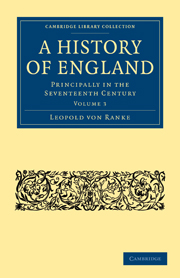Book contents
- Frontmatter
- Contents
- BOOK XI THE COMMONWEALTH IN ENGLAND, 1649—1653
- BOOK XII THE PROTECTORATE OF OLIVER CROMWELL, 1653–1658
- BOOK XIII FALL OF THE PROTECTORATE AND THE COMMONWEALTH. RESTORATION OF THE MONARCHY, 1658—1660
- BOOK XIV THE FIRST FIVE YEARS UNDER CHARLES II. THE RESTORATION OF THE ANGLICAN CHURCH
- BOOK XV THE DUTCH WARS OF CHARLES II. ESTABLISHMENT OF THE PROTESTANT AND PARLIAMENTARY CHARACTER OF THE CONSTITUTION 1664—1674
- INTRODUCTION
- CHAP. I The first war with Holland, in the year 1665
- CHAP. II Influence of France upon the continuation of war and upon the peace
- CHAP. III Fall of the Lord Chancellor Clarendon
- CHAP. IV Convention at the Hague in January 1668. Triple Alliance
- CHAP. V Government and Parliament in the year 1668
- CHAP. VI Secret alliance with France, 1669, 1670
- CHAP. VII Parliamentary sessions from, 1669 to 1671
- CHAP. VIII The second war against Holland, 1672
- CHAP. IX Origin of the Test Act
- CHAP. X Peace with Holland
- CHAP. XI Union of Parliament with the Prince of Orange
CHAP. VIII - The second war against Holland, 1672
Published online by Cambridge University Press: 07 June 2011
- Frontmatter
- Contents
- BOOK XI THE COMMONWEALTH IN ENGLAND, 1649—1653
- BOOK XII THE PROTECTORATE OF OLIVER CROMWELL, 1653–1658
- BOOK XIII FALL OF THE PROTECTORATE AND THE COMMONWEALTH. RESTORATION OF THE MONARCHY, 1658—1660
- BOOK XIV THE FIRST FIVE YEARS UNDER CHARLES II. THE RESTORATION OF THE ANGLICAN CHURCH
- BOOK XV THE DUTCH WARS OF CHARLES II. ESTABLISHMENT OF THE PROTESTANT AND PARLIAMENTARY CHARACTER OF THE CONSTITUTION 1664—1674
- INTRODUCTION
- CHAP. I The first war with Holland, in the year 1665
- CHAP. II Influence of France upon the continuation of war and upon the peace
- CHAP. III Fall of the Lord Chancellor Clarendon
- CHAP. IV Convention at the Hague in January 1668. Triple Alliance
- CHAP. V Government and Parliament in the year 1668
- CHAP. VI Secret alliance with France, 1669, 1670
- CHAP. VII Parliamentary sessions from, 1669 to 1671
- CHAP. VIII The second war against Holland, 1672
- CHAP. IX Origin of the Test Act
- CHAP. X Peace with Holland
- CHAP. XI Union of Parliament with the Prince of Orange
Summary
The expression ‘Cabal ministry,’ which is used in English history only with hatred and contempt, is not quite intelligible. The five men, the initial letters of whose titles formed this name, were only a commission for foreign affairs, from which the members of the Privy Council, who at other times were admitted to consult about these affairs, were at this time excluded. Their common action consisted in regularly meeting to take measures for carrying out the French treaty which they had concluded, and in being in the King's confidence on that point. Amongst themselves they were very different.
Thomas Clifford must be looked upon as the soul of the Catholic project. The names of his forefathers appear from the time of the Conquest, fighting for the King against Wales, Scotland, and France; similarly Hugh Clifford of Ugbrooke, who belonged to the younger and less wealthy line, took part in Charles I's war against the Scots in the year 1639, as commander of a foot regiment; he died of an illness which he then contracted. His son was Thomas, who already had made himself remarkable at the University by a fiery insubordination of conduct and even of mind; and afterwards in Parliament, where he represented Totnes, he introduced the knightly spirit, with which he was filled, into civil affairs as well. He spoke well and made an impression.
- Type
- Chapter
- Information
- A History of EnglandPrincipally in the Seventeenth Century, pp. 515 - 530Publisher: Cambridge University PressPrint publication year: 2010First published in: 1875



